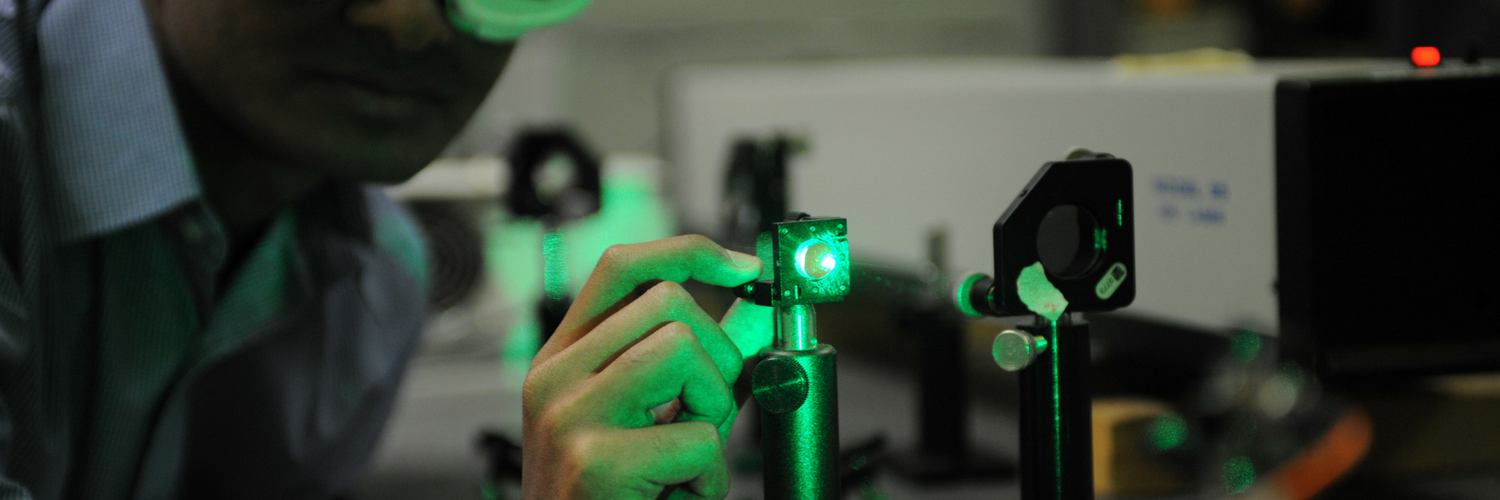The Ph.D. in Cell and Molecular Biology
The doctoral degree in cell and molecular biology at Florida Tech develops the skills necessary to design and carry out a high-quality research program in the broad field of cell and molecular biology.
While the majority of time in the research-based program is spent carrying out an advanced research project in an advisor’s dissertation field, the curriculum includes core coursework in molecular genetics and cell and molecular biology, as well as more specialized coursework in topics like cancer biology, bioinformatics, protein structure and function, signal transduction and cardiovascular physiology.
The Details
The average time to complete the cell and molecular biology Ph.D. at Florida tech is 5.5 years and requires completion of 73 credits from a bachelor’s degree or 42 credits from a master’s degree. To be accepted into the program, applicants must have a 3.0 GPA or above and undergraduate coursework in genetics, biochemistry and cell biology.
“Why pursue a Ph.D. in cell and molecular biology at Florida Tech? ”
You already know we have your major.
Now learn everything else you want to know!
Keep it simple.
Get the facts about graduate studies at Florida Tech
You have two graduate study opportunities:
- On Campus
- At an Education Center near you Get the Education Center Brochure
You have three graduate study opportunities:
- On Campus
- At an Education Center near you
- 100% Online Learn more about Florida Tech Online
Get the Education Center Brochure
You have two graduate study opportunities:
- On Campus
- 100% Online Learn more about Florida Tech Online
You have two graduate study opportunities:
- At an Education Center near you
- 100% Online Learn more about Florida Tech Online
Get the Education Center Brochure
Experienced Faculty
Doctoral-level cell and molecular biology faculty are more than professors; they are mentors. Florida Tech professors bring immeasurable expertise to the classroom and to their research labs in a wide range of areas, including bacterial genetics and antibiotic discovery, genetic engineering, bioinformatics, gene modification, neurodegenerative disease, cardiovascular physiology and diseases and plant/bacterial communication. Working alongside their professors and fellow graduate students, students learn both the intricacies of cells, tissue and molecular functions and key collaboration and communication skills.
High-Tech Labs
At Florida Tech, resources and cutting-edge workspaces abound. On campus, cell and molecular biology Ph.D. students can take advantage of:
- Eight modern research labs
- Eight teaching labs
- A 16-workstation computer facility
- An electron microscopy suite
- A modern instrumentation lab
- A small-mammal care facility
- A temperature-controlled, 800-square-foot greenhouse
“What cell and molecular biology research opportunities Can I Expect at Florida Tech? ”
The cell and molecular biology Ph.D. program is largely research-based. All research is conducted alongside Florida Tech faculty within the scope of their dissertation fields. Current cell and molecular biology faculty research interests include:
- Identification of novel antibiotic targets
- Regulation of bacterial growth
- Quorum sensing in bacteria and algae
- Understanding how organisms adapt to chronic environmental stress
- Cardiovascular physiology
- Signal transduction during fertilization
- How protein structures change during the onset of neurodegenerative diseases
Research Facilities
Among the laboratories available for cell and molecular biology research, Ph.D. students can take advantage of these unique facilities:
- Center for High-Resolution Microscopy and Imaging: This multidisciplinary laboratory for molecular biology research provides state-of-the-art light and fluorescence microscopy, confocal microscopy, transmission electron microscopy, scanning electron microscopy, scanning probe microscopy and X-ray microanalysis of natural and artificial materials. The lab can prepare almost any kind of sample for microscopic evaluation, image sample surfaces and cross-sections at very high resolutions and analyze elemental compositions of materials.
- Instrumentation Laboratory for Cell and Molecular Biology Research: This laboratory houses modern instrumentation used for characterizing gene expression, isolation and quantification of nucleic acids and other cellular components, high-resolution image documentation and analysis and microplate analysis.
“How will a cell and molecular biology Ph.D. benefit my career? ”
Along with the opportunity to further their scientific research, individuals with a cell and molecular biology Ph.D. gain increased earning potential and positioning as a subject-matter expert.
A doctoral degree is required to direct an academic or industrial scientific research lab. It is also required for most faculty positions in four-year colleges and universities, as well as most editorial positions in scientific journals and administrative and policy-making positions in federal government agencies, like the National Science Foundation, the National Institutes of Health, the Centers for Disease Control, the National Oceanic and Atmospheric Administration, NASA and more. A cell and molecular biology Ph.D. graduate can work as a:
- College professor
- Pharmaceutic research lab director
- Biotech company research lab director
- Government research lab director
- Scientific director in academia and industry
- Scientific consultant
- Scientific writer and editor
- Many more

 Give to Florida Tech
Give to Florida Tech 